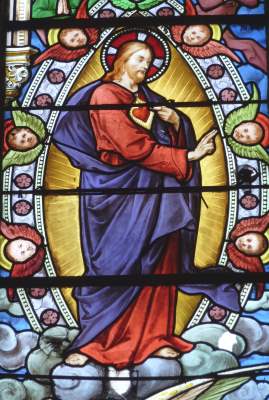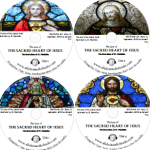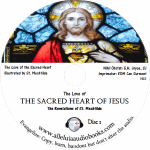Reparation to the Sacred Heart of Jesus: How Did Christ Make Reparation?
Click Here to Download the Entire AudioBook on Reparation to the Sacred Heart of Jesus
Transcript
But we must examine this matter more closely. How did Christ make Reparation?
By suffering. Here a problem confronts us. The Son of God, desiring to renew His work, to restore all to its primitive condition, was not obliged to choose a plan of redemption which would involve for Himself a life of suffering, pain and humiliation. Yet it was precisely this plan that He chose, rejecting all others, because He willed to repair all by suffering.
Whence it follows that, as we are necessarily united with Christ in His mission, since we form His Mystical Body, so we must necessarily cooperate with Him in His sufferings or ” Passion.” Therefore, St. Paul when explaining the necessity of our co-operating with Jesus in His work of Redemption, goes straight to the point and tells us that we must ” fill up those things that are wanting,” not in the mission of Christ, but in His Passion. The two unite, neither can exist alone. We must make Reparation with Christ, and we can only do this by uniting our sacrifice with His.
Bossuet writes : ” In order to become the Saviour of men, Jesus Christ willed to be a Victim. But since He has a Mystical Body, it follows that if the Head is immolated, all the members like wise must become living victims ” (Serm. pour la Pur if. de la Ste. Vierge).
Here is the progression we might more correctly say the equation be a Christian, a saviour, a victim. Nor is the term ” victim ” something strange or new. This doctrine is as old as the Gospel. It is the very foundation of the preaching of St. Paul, of the early Fathers and of the Church in all ages. The Apostle, in his Epistle to the Romans, sets forth this doctrine very clearly. He writes: “I beseech you therefore, brethren, by the mercy of God, that you present your bodies a living sacrifice, holy, pleasing unto God (xii. i).
We cannot be true Christians and at the same time strive to lead a comfortable life, hoping at its close to pass quietly, without any shock, from a world in which we were very well off, to a heaven where we shall be perfectly happy; a heaven that is to be the reward of a life in which practically our chief anxiety has been to leave to others the laborious task of co-operating with Christ in redeeming the world. No, indeed, such a programme is incompatible with the Gospel of our Divine Master. His programme is totally different; it consists in the ” terrible seriousness of human life,” as Bossuet calls it.
Yes, deep abysses surround us: that of mans sin, that of Gods love. God has placed the latter close to the former, and we stand between the two with our role clearly and imperatively defined. It is characteristic of the true disciple of Jesus Christ that he has found out these abysses and, in consequence, lives in an irrepressible anxiety for the salvation of the world, both on account of the sterility of the Precious Blood and of his share of responsibility in the story of the Divine life upon earth.
All Christians are under two obligations: First, they must make Reparation in union with Jesus Christ, who came upon earth solely for this purpose and, with whom, they form one unit. Secondly, they must make this Reparation as He wills namely, by suffering.
Too few of the faithful have the faintest conception of the Christian life; they seem to imagine that practically there are two doctrines taught by our Lord, or at least two ways of interpreting His one law one consisting in trying to suffer, the other in striving not to suffer at all; one of deliberate mortification, the other of deliberate avoidance of whatever is irksome. Briefly stated, they believe in an easy-going, comfortable kind of Christianity destined for the majority of Christians, whereas the other kind of Christianity, austere and crucifying, is reserved for those stern characters or fantastical people who feel drawn to it. as the Cure d Ars, a Saint, should write as follows : ” Everything reminds us of the cross. We ourselves are made in the form of a cross. Balm and sweet ness exhale from the cross. The unction, which overflows from the cross, inundates our souls, in proportion as we unite ourselves with it, holding it tightly against our hearts. The cross contains more wisdom than any book; all who do not know this book are ignorant, however many other books they may have studied. Those only are truly wise who love and consult this book, who study it deeply. Bitter as this book is, they are never happier than when they can immerse themselves in its bitterness. The more they frequent this school, the more they desire to remain there, never do their studies weary them.”
In a novitiate of the Franciscans of Mary, in Canada, on one occasion six religious were wanted to go to China to take care of some lepers. There were forty novices, and all the forty volunteered, each eager to have that honour. Some Christians, hearing this, remark coldly: ” It is their vocation.” The very examples which should arouse these lax souls and convince them that they are bound to do something, if not as much as these nuns, only serve as specious pretexts for justifying their inaction.
They argue thus: Monks and nuns remain in prayer all night, prostrate before the altar, or rise for prayer at two in the morning in order that we may sleep on comfortably in a good bed. They pass their time in prayer in order to dispense us from this exceedingly disagreeable task. They deprive themselves of food, therefore we can allow ourselves every luxury. They live in white washed cells, furnished only, like those of Carmelites, with a crucifix, a holy water stoup, a deaths head, and a discipline, so that we may adorn our houses with numerous ornaments and every modern comfort. If these religious go without fires, it is to allow us to have an excellent system of heating and a pleasant temperature in our rooms and passages. They sleep on a plank or a straw mattress, that we may have silken eider down coverlets and embroidered counterpanes. Their only jewelry is the cross, therefore we can wear trinkets and pearl necklaces that cost a fortune.
Undoubtedly, the perfect life exacts an amount of suffering, for which an ordinary Christian life does not call, but can we imagine any truly enlightened Christian life even an ordinary one that in any way harmonises with the feverish and pagan pursuit of the comforts of life, which modern materialism tries and, unhappily, too often with success to impose upon so many of Christs disciples?
What then Is Christ, perchance, divided? Are there two Christs? Is there a crucified Christ, whom we can only serve by our crucifixion, and a restful Christ, whom we can manage to follow quite well while partaking of all lifes joys and pleasures? St. Paul did not preach two Christs. He knew of One only, “Christ crucified” (i Cor. ii. 2).
Men have changed this since St. Paul’s; time. Now they know of two. The first, the true Christ, did not suffice, so they invented another, one without a cross, or a crucifying doctrine, a Christ without those two beams which cast such a disquieting impressive shadow, a Christ whose demands amount to this: Live as you please; I promise you a happy eternity, provided that ” you turn to me in your last moments with your darkening mind, that you repent with your failing will and give me the alms of your last breath.”*
There is no such Christ as this for Christians who will not suffer. The disciple is not greater than his Master. Our Saviour has suffered, and every Christian must suffer in some form or other as we shall explain if he would not prove false to his name, or fail to accomplish his mission; he must always and necessarily be the friend of suffering.
A great Belgian statesman took for his motto, ” Rest elsewhere.” The day of perfect happiness, perhaps not far off, will surely dawn, perhaps soon, and will have no sunset. Meanwhile time is given us that we may merit ” the joy of the Lord.” But we can only enter into the joy of the Lord on condition that upon earth we have shared the
sufferings of our Lord. Christ was the first to choose suffering as the way into glory. ” Golgotha is not a rhetorical flourish.” For us too the same rule holds.
We wish to triumph with Him, therefore we must fight with Him. ” Let all who are afraid remain where they are, let the others cross over and follow me.”
This is stern language, and in spite of the convincing force of the doctrine many drawback rather than face the suffering which is the in evitable consecration of all Christian life.
Download MP3 of Reparation to the Sacred Heart of Jesus: Part 2 How Did Christ Make Reparation (Right Click and Select Save As)
Click Here to Go Back To the AudioBook Page
Credits
This work is an abrigement of a Chapter from the book The Ideal of Reparation by Father Raoul Plus SJ or more details on how this work was abriged please visit the Audiobook page
Image cropped from image with attribution license here
You may also like:
- Reparation to the Sacred Heart of Jesus: Part 1 Reparation is a Fundamental Obligation of Christianity.
- Catholic AudioBook: Reparation to the Sacred Heart of Jesus
- Catholic Audiobook: St. Thomas Aquinas for Lent
- Audiobook: The Great Advent Homilies of St Bernard of Clairvaux
- Catholic Audiobook: The Vigil of the Natvity and Advent Homilies of St Bernard
- Reparation to the Sacred Heart of Jesus: Part 7 Reparation For the Sake of Love
- Reparation to the Sacred Heart of Jesus: Part 5 Reparation, an Actual Demand of Today






